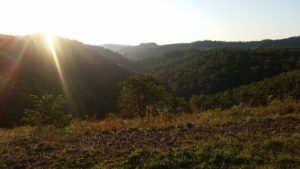 As a PLACES Fellow, the relationship between place and identity has been central to our lessons on realizing equity. Our recent visit to Charleston, West Virginia – self-proclaimed capital of the Appalachian Mountains – highlighted the complexity, and importance of this relationship. The city is rich with beauty and surrounded by scenery that gives you reason to pause and breathe deeply (something I am especially grateful for, as a New Yorker.) It’s easy to understand the deep pride and identity residents have developed with their city.
As a PLACES Fellow, the relationship between place and identity has been central to our lessons on realizing equity. Our recent visit to Charleston, West Virginia – self-proclaimed capital of the Appalachian Mountains – highlighted the complexity, and importance of this relationship. The city is rich with beauty and surrounded by scenery that gives you reason to pause and breathe deeply (something I am especially grateful for, as a New Yorker.) It’s easy to understand the deep pride and identity residents have developed with their city.
For generations, Charleston’s vitality and identity has been directly connected to coal mining. Like many places, the unique economic engine of the region drives more than people’s income – it has informed and shaped their culture. It wasn’t long into our trip before we saw the effects of the well-documented challenges facing the coal economy. Throughout our visit, we heard from city leaders who consistently expressed how integral it’s been to keep Charleston focused on the future and what the city is becoming – not only what it has it been. This requires a willingness to consider and embrace a new identity – one that is built on present realities.
Many cities around the country are navigating a similar experience – attempting to create a new identity for themselves. This, at a time when technological shifts and labor markets disruptions are forcing local communities to redefine what they are known for and what makes them viable places to live, work and play. Our experience in Charleston made clear, that communities who chose to redefine themselves must do so in a manner that includes the present and experienced identities of residents, and an understanding of how the systems and institutions that have been designed to serve them map those identities.
 True to definition, residents in Charleston may claim one of many different identities – representing an intersectionality that their city (like many others) must account for to achieve equity. What does it mean for systems in Charleston to support residents who may identify as Appalachian and gay and/or underemployed and/or managing substance abuse and/or a member of a faith-based community? Given these identities, how do you generate economic development and produce quality jobs in a region that is recovering from over-dependence on a singular industry? The answers to these questions may help Charleston’s leaders identify what comes next for a city with traditional and emergent identities.
True to definition, residents in Charleston may claim one of many different identities – representing an intersectionality that their city (like many others) must account for to achieve equity. What does it mean for systems in Charleston to support residents who may identify as Appalachian and gay and/or underemployed and/or managing substance abuse and/or a member of a faith-based community? Given these identities, how do you generate economic development and produce quality jobs in a region that is recovering from over-dependence on a singular industry? The answers to these questions may help Charleston’s leaders identify what comes next for a city with traditional and emergent identities.
The leaders we met in Charleston see a life beyond coal. “We decided to focus on solutions and not just confrontation,” said Matt Wasson from Appalachian Voices (AV). AV is a twenty-year-old advocacy organization that works to engage and uplift citizens across Appalachia on decisions that affect their families and communities. Their work has helped elevate the significance and value of living and working in the Appalachian Mountains. Through partnerships, AV aims to advance policies and programs that create economic opportunity for residents in Appalachia – like investigating the region’s potential for a robust solar industry. Yet others are actively creating brand new industries. Dr. Rusty Kruzelock of the West Virginia Regional Technology Park gave us an up-close look at the Green Mining Model Business Program. The initiative creates jobs and business opportunities for former miners and other related trades, through the creation of a  lavender farm. With the global essential oil market projected to reach $11.1B in the next five years – could Charleston be the next lavender capital of America?
lavender farm. With the global essential oil market projected to reach $11.1B in the next five years – could Charleston be the next lavender capital of America?
These promising solutions mirror the actions of conservation groups and funders who are committed to clean energy in the U.S. Dillon, my Lyft driver at the airport, took time to share his family’s rich history in mining and how it’s defined their traditions and beliefs. This cannot be unique to just Dillon. Despite any solutions created by concerned stakeholders, residents must see themselves as a part of these efforts, if they are to be successful. Will former miners be interested in working in the essential oil or solar industry? Will they want to build the relevant new skills? Political discourse on environmental and energy issues make it hard for communities to navigate rhetoric and fact. So much so, that there is a stubborn belief that coal will make a comeback. Miners who know that coal still exists in their hometown may not be interested in retraining. However, the city’s livelihood is inextricably tied to its identity as a home for coal.
For most, our first instincts about identity are originated at home. The uniqueness of where we live and how we experience the environment around us, can profoundly shape the identity we carry into the world. While we may hold multiple identities – our PLACES experience in Charleston made one thing abundantly clear – regardless of how a person defines themselves – the place they choose to live, should create opportunities for them to live their best life.
About the Author:
 Mekaelia Davis is the Program and Policy Strategist at Prudential Financial and a 2017 TFN PLACES Fellow.
Mekaelia Davis is the Program and Policy Strategist at Prudential Financial and a 2017 TFN PLACES Fellow.
